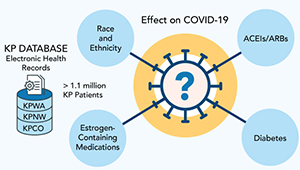Susan Shortreed, PhD
Biography
Susan Shortreed, PhD, uses statistics and machine learning methods to address health science problems, with a special emphasis on analyzing complex longitudinal data. She develops and evaluates statistical approaches for observational data, and works to improve the design and analyses of studies that use data collected from electronic health care records. She is leading a project to develop statistical methods for constructing personalized treatment strategies using data captured from electronic health records.
Dr. Shortreed earned her PhD in statistics from the University of Washington. Then she spent two years in the Department of Epidemiology and Preventive Medicine at Monash University in Melbourne, Australia, and two years in the School of Computer Science at McGill University in Montreal, Canada. Dr. Shortreed has collaborated with scientists in a broad range of areas including alcohol use, cancer screening, and medication safety. She now works alongside researchers in mental and behavioral health, evaluating and comparing treatments for chronic pain and depression, and interventions to prevent suicide. Dr. Shortreed is an investigator with the Mental Health Research Network, designing studies to address important public health concerns, such as determining which antidepressant medications work best for which patients and developing risk prediction algorithms to identify individuals who may be at increased risk for suicidal behavior.
Dr. Shortreed is also an affiliate professor of biostatistics at the University of Washington School of Public Health. She served on the executive board for the American Statistical Association’s Section on Statistics in Epidemiology and the editorial board of the Journal of the Royal Statistical Society, Series C: Applied Statistics.
Research interests and experience
-
Biostatistics
Design and analysis of studies that use data collected from electronic health records; analysis of complex longitudinal data; methods for constructing personalized treatment strategies, computational statistics and algorithms; machine learning; variable selection methods.
Medication Use & Patient Safety
Biostatistics; machine learning; using data collected from electronic health records to study rare adverse events; opioid safety; medication safety in pregnancy.
-
Mental Health
Biostatistics; treatment for chronic depression; suicide prevention; developing personalized treatment strategies; developing risk prediction models.
Recent publications
Von Korff M, Dublin S, Walker RL, Parchman M, Shortreed SM, Hansen RN, Saunders K. The impact of opioid risk reduction initiatives on high-dose opioid prescribing for chronic opioid therapy patients. J Pain. 2016 Jan;17(1):101-10. doi: 10.1016/j.jpain.2015.10.002. Epub 2015 Oct 22. PubMed
Balderson BH, McCurry SM, Vitiello MV, Shortreed SM, Rybarczyk BD, Keefe FJ, Von Korff M. Information without implementation: a practical example for developing a best practice education control group. Behav Sleep Med. 2015 Oct 20:1-14.[Epub ahead of print]. PubMed
LeResche L, Saunders K, Dublin S, Thielke S, Merrill JO, Shortreed SM, Campbell C, Von Korff MR. Sex and age differences in global pain status among patients using opioids long term for chronic noncancer pain. J Womens Health (Larchmt). 2015 Aug;24(8):629-35. PubMed
Lapham GT, Rubinsky AD, Shortreed SM, Hawkins EJ, Richards J, Williams EC, Berger D, Chavez LJ, Kivlahan DR, Bradley KA. Comparison of provider-documented and patient-reported brief intervention for unhealthy alcohol use in VA outpatients. Drug Alcohol Depend. 2015 Aug 1;153:159-66. doi: 10.1016/j.drugalcdep.2015.05.027. Epub 2015 May 27. PubMed
Friesen MC, Shortreed SM, Wheeler DC, Burstyn I, Vermeulen R, Pronk A, Colt JS, Baris D, Karagas MR, Schwenn M, Johnson A, Armenti KR, Silverman DT, Yu K. Identifying similar exposure scenarios in occupational questionnaire responses using hierarchical cluster models. Ann Occup Hyg. 2015;59(4):455-66. PubMed
Saunders K, Shortreed S, Thielke S, Turner JA, LeResche L, Beck R, Von Korff M. Evaluation of health plan interventions to influence chronic opioid therapy prescribing. Clin J Pain. 2015 Jan 23. PubMed
Saunders KW, Shortreed SM, Von Korff M, Thielke S, Turner JA, LeResche LA. Physician attitudes toward chronic opioid therapy: relationship to prescribing behaviors. Health Serv Res. 2015;31(9):820-829. PubMed
Friesen MC, Shortreed SM, Wheeler DC, Burstyn I, Vermeulen R, Pronk A, Colt JS, Baris D, Karagas MR, Schwenn M, Johnson A, Armenti KR, Silverman DT, Yu K. Using hierarchical cluster models to systematically identify groups of jobs with similar occupational questionnaire response patterns to assist rule-based expert exposure assessment in population-based studies. Ann Occup Hyg. 2015 May;59(4):455-66. doi: 10.1093/annhyg/meu101. Epub 2014 Dec 3. PubMed
Turner JA, Saunders K, Shortreed SM, LeResche L, Riddell K, Rapp SE, Von Korff M. Chronic opioid therapy urine drug testing in primary care: prevalence and predictors of aberrant results. J Gen Intern Med. 2014 Dec;29(12):1663-71. doi: 10.1007/s11606-014-3010-y. Epub 2014 Sep 13. PubMed
Shortreed SM, Laber E, Scott Stroup T, Pineau J, Murphy SA. A multiple imputation strategy for sequential multiple assignment randomized trials. Stat Med. 2014 Oct 30;33(24):4202-14. doi: 10.1002/sim.6223. Epub 2014 Jun 11. PubMed
Research

COVID risks not meaningfully greater with estrogen-containing medications
Oral contraceptives, hormone therapy not linked to more severe COVID outcomes.
Research

A medication that can relieve symptoms of psychosis is underused
Study finds that many patients who might benefit from clozapine don’t receive it.
Research

New findings on treating hypertension in pregnancy
A study led by Dr. Sascha Dublin finds similar outcomes for 3 hypertension medications, filling an evidence gap.
COVID-19

Greater infection risks linked to COVID-19 disparities
New work by Susan Shortreed, PhD, finds infection risks drive worse outcomes for some racial and ethnic groups.
Drugs, diabetes, disparities

Studying COVID-19 risk and outcomes
Dr. Sascha Dublin tells how studies of KP electronic health record data can improve COVID-19 treatment and prevention.
KPWHRI IN THE MEDIA
Simpler models for predicting suicide risk work comparably to more complex ones
Q&A: Simple machine learning model predicts suicide risk well
Healio Psychiatry, April 12, 2023



